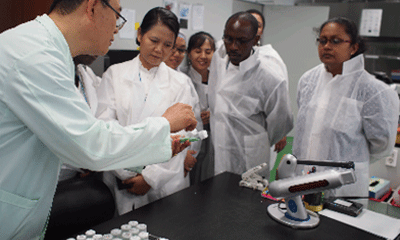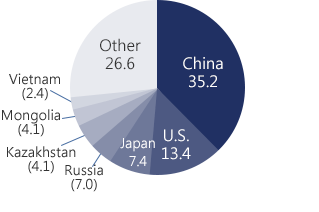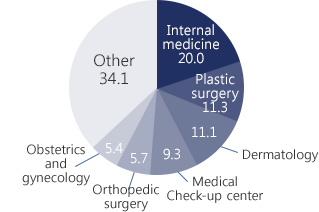Policies
Global Cooperation
The Ministry aims to contribute to improving global health and the welfare system via interactive cooperation with the international community and partner countries.
Overseas Expansion of Korean Healthcare
The Republic of Korea contributes to the establishment of international norms, standards, and framework of global health by engaging in the annual WHO Executive Board and World Health Assembly.
Notably, Korea joined the WHO Executive Board in 2020 and will serve from 2020 through 2023. Since then, Korea, as a member of the board, has taken a more proactive role in discussions on health agenda.
Furthermore, Korea’s response to COVID-19, the pandemic that swept the world in 2020, has garnered global attention. As a result, we are sharing our experiences on containing COVID-19 with other countries through various channels. In addition, our nation is actively engaged in new initiatives including ACT-A to lead the efforts to resolve global health issues including the equitable distribution of vaccines, therapeutics, and diagnostics.
With our focus on the WHO, Korea has participated in collaborative efforts to improve global health and welfare as a member of the OECD, ASEAN +3, UN, G20, and APEC.
Notably, Korea joined the WHO Executive Board in 2020 and will serve from 2020 through 2023. Since then, Korea, as a member of the board, has taken a more proactive role in discussions on health agenda.
Furthermore, Korea’s response to COVID-19, the pandemic that swept the world in 2020, has garnered global attention. As a result, we are sharing our experiences on containing COVID-19 with other countries through various channels. In addition, our nation is actively engaged in new initiatives including ACT-A to lead the efforts to resolve global health issues including the equitable distribution of vaccines, therapeutics, and diagnostics.
With our focus on the WHO, Korea has participated in collaborative efforts to improve global health and welfare as a member of the OECD, ASEAN +3, UN, G20, and APEC.
International Patient Services

Korea offers quick and effective diagnoses and treatments for foreign patients, drawing on a large pool of competent doctors, innovative technology, and highly efficient systems.
To facilitate foreign patient services, the Ministry has a support system in place, ensuring convenient and safe treatments for foreigners across Korea. Medical institutions treating foreign patients arrange interpretation and multilingual medical consultation services, and these hospitals are required to buy compensation insurance for possible adverse events. To officially recognize exemplary hospitals or medical centers, the Ministry has implemented the Korean Accreditation Program for Hospitals Serving Foreign Patients.
From a wide range of regions, including China, the Middle East, Thailand and other Southeast Asian countries, as well as Russia and other Commonwealth of independent States (CIS), international patients are coming to Korea for treatment. In 2016 alone, more than 364,000 foreign patients received treatment in Korea. This is a 23% increase from the previous year, and this rising trend is projected to continue in the future. An increasing number of these inbound patients are seeking care for cancer, stroke, etc.
To facilitate foreign patient services, the Ministry has a support system in place, ensuring convenient and safe treatments for foreigners across Korea. Medical institutions treating foreign patients arrange interpretation and multilingual medical consultation services, and these hospitals are required to buy compensation insurance for possible adverse events. To officially recognize exemplary hospitals or medical centers, the Ministry has implemented the Korean Accreditation Program for Hospitals Serving Foreign Patients.
From a wide range of regions, including China, the Middle East, Thailand and other Southeast Asian countries, as well as Russia and other Commonwealth of independent States (CIS), international patients are coming to Korea for treatment. In 2016 alone, more than 364,000 foreign patients received treatment in Korea. This is a 23% increase from the previous year, and this rising trend is projected to continue in the future. An increasing number of these inbound patients are seeking care for cancer, stroke, etc.
Foreign Physician Training
We are running a medical training program for foreign physicians in Korea to share our medical experiences and techniques in the field. A total of 458 foreign physicians, including 133 Mongolians and 56 Russians, have taken the government-organized program since 2012. For Saudi physicians and dentists, 1 to 3 years of long-term training programs are provided.
Expanding Medical Services Overseas
Korea is expanding its medical presence overseas in both depth and breadth. Korean pharmaceutical and medical device
companies are aggressively making inroads into the international market. Korea’s medical institutions are establishing and operating hospitals, diagnostic centers and fertility centers,
while providing hospital information systems and transferring technologies across the border.
Korea’s response to COVID-19 in 2020 has allowed its healthcare to build a positive reputation and trust worldwide, leading to an increased export of medical supplies for disease control and prevention, including diagnostic equipment and reagents, and an growing number of medical institutions advancing into the overseas market.
The Ministry is promoting healthcare cooperation with countries around the world, including information sharing and exchanges, and supporting Korea’s healthcare services to tap into the global healthcare market.
Korea’s response to COVID-19 in 2020 has allowed its healthcare to build a positive reputation and trust worldwide, leading to an increased export of medical supplies for disease control and prevention, including diagnostic equipment and reagents, and an growing number of medical institutions advancing into the overseas market.
The Ministry is promoting healthcare cooperation with countries around the world, including information sharing and exchanges, and supporting Korea’s healthcare services to tap into the global healthcare market.
International Patients by Nationality and Treatment (2016)
Percentage of patients by nationality Percentage of patients by treatment



- china :35.2
- U.S:13.4
- Japan:7.4
- Russia:7.0
- Kazakhstan:4.1
- Mongolia:4.1
- Vietnam:2.4
- Other:26.6

- Intermal medicine : 20.0
- Plastic surgery : 11.3
- Dermatology : 11.1
- Medical Check-up center : 9.3
- Orthopedic surgery : 5.7
- Obstetrics and gynecology : 5.4
- Other : 34.1
Official Development Assistance (ODA)
In 2010, the Korean government became an official member of the Development Assistance Committee (DAC) of the Organization for Economic Cooperation and Development (OECD). Since then,
we have expanded the scale of Official Development Assistance (ODA) and have cooperated with the international community to help achieve the Sustainable Development Goals (SDGs) by 2030 around the world. Right after the Korean War (1950-1953), the Republic of Korea received tremendous
foreign medical aid and other external resources, which helped us rebuild and develop a successful healthcare system. Based on the invaluable experience, we wish to provide such philanthropic
assistance to developing partner countries in the hope of strengthening the quality of life. To achieve this vision, we established the Korea Foundation for International Healthcare (KOFIH) in 2006,
through which we have carried out a wide range of cooperative ODA activities in the field of healthcare across countries in need.
Taking advantage of our expertise in the healthcare, we are now focusing on providing humanitarian aid and transferring knowledge by various projects and programs, including invitational training program to healthcare professionals through the Dr LEE Jong-wook Fellowship Program which was named after the late WHO Director-General to uphold his legacy. In addition, we implement projects in partner countries to strengthen their healthcare systems through the Maternal, Neonatal, and Child Healthcare Promotion Program, Project for Strengthening Capacity of Infectious Disease Control, Hospital Management Technical Cooperation Program, Partnership Project for Universal Health Coverage, Primary Healthcare System Enhancement Project, and Public Private Partnership Project.
Taking advantage of our expertise in the healthcare, we are now focusing on providing humanitarian aid and transferring knowledge by various projects and programs, including invitational training program to healthcare professionals through the Dr LEE Jong-wook Fellowship Program which was named after the late WHO Director-General to uphold his legacy. In addition, we implement projects in partner countries to strengthen their healthcare systems through the Maternal, Neonatal, and Child Healthcare Promotion Program, Project for Strengthening Capacity of Infectious Disease Control, Hospital Management Technical Cooperation Program, Partnership Project for Universal Health Coverage, Primary Healthcare System Enhancement Project, and Public Private Partnership Project.